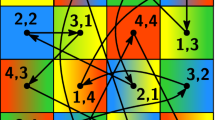Abstract
Theory and application of Cellular automata (CA) as a global Transform for detecting compositeness of a number is reported. To test an n bit odd valued number N in the range 2n − 1 to (2n-1), a Compositeness Detecting CA (CDCA) set is designed with N = S as a Self Loop Attractor (SLA) State, where S = S ′ × S ″, S ′ is the largest factor of S, S ″ = 3,5,7,⋯. The set has at least one CDCA with the state S ′ in its attractor basin; the CA initialized with S ′ reaches the attractor S after S ″ time steps. A number is detected as a prime if no CDCA is synthesized.
Access this chapter
Tax calculation will be finalised at checkout
Purchases are for personal use only
Preview
Unable to display preview. Download preview PDF.
Similar content being viewed by others
References
Baillie, R., Wagstaff Jr., S.S.: Lucas pseudoprimes. Math. Comp. 35, 1391–1417 (1980)
Cohen, H., Lenstra Jr., H.W.: Primality testing and jacobi sums. Math. Comp. 42, 297–330 (1984)
Solovay, R.M., Strassen, V.: A fast monte-carlo test for primality. SIAM Journal on Computing 6(1), 84–85
Agrawal, M., Kayal, N., Saxena, N.: Primes is in p. Annals of Mathematics 160(2), 781–793 (2004)
Lenstra Jr., H.W., Pomerance, C.: Primality testing with gaussian periods (July 2005), Preprint Available as http://www.math.dartmouth.edu/~carlp/PDF/complexity072805.pdf
Miller, G.L.: Riemann’s Hypothesis and Tests for Primality. Journal of Computer and System Sciences 13(3), 300–317 (1976), doi:10.1145/800116.803773
Maiti, N.S., Ghosh, S., Munshi, S., Pal Chaudhuri, P.: Linear Time Algorithm for Identifying the Invertibility of Null-Boundary Three Neighborhood Cellular Automata. Complex Systems 19(1) (2010)
Maiti, N.S., Ghosh, S., Sikdar, B.K., Pal Chaudhuri, P.: Rule Vector Graph (RVG) to Design Linear Time Algorithm for Identifying the Invertibility of Periodic-Boundary Three Neighborhood Cellular Automata. Journal of Cellular Automata 7(4), 335–362 (2012)
Ghosh, S., Maiti, N.S., Sikdar, B.K., Pal Chaudhuri, P.: On Invertible Three Neighborhood Null Boundary Uniform Cellular Automata. Complex Systems 20(1), 47–65 (2011)
Author information
Authors and Affiliations
Editor information
Editors and Affiliations
Rights and permissions
Copyright information
© 2014 Springer International Publishing Switzerland
About this paper
Cite this paper
Maiti, N.S., Ghosh, S., Chaudhuri, P.P. (2014). Cellular Automata (CA) Model for Primality Test. In: Wąs, J., Sirakoulis, G.C., Bandini, S. (eds) Cellular Automata. ACRI 2014. Lecture Notes in Computer Science, vol 8751. Springer, Cham. https://doi.org/10.1007/978-3-319-11520-7_16
Download citation
DOI: https://doi.org/10.1007/978-3-319-11520-7_16
Publisher Name: Springer, Cham
Print ISBN: 978-3-319-11519-1
Online ISBN: 978-3-319-11520-7
eBook Packages: Computer ScienceComputer Science (R0)




